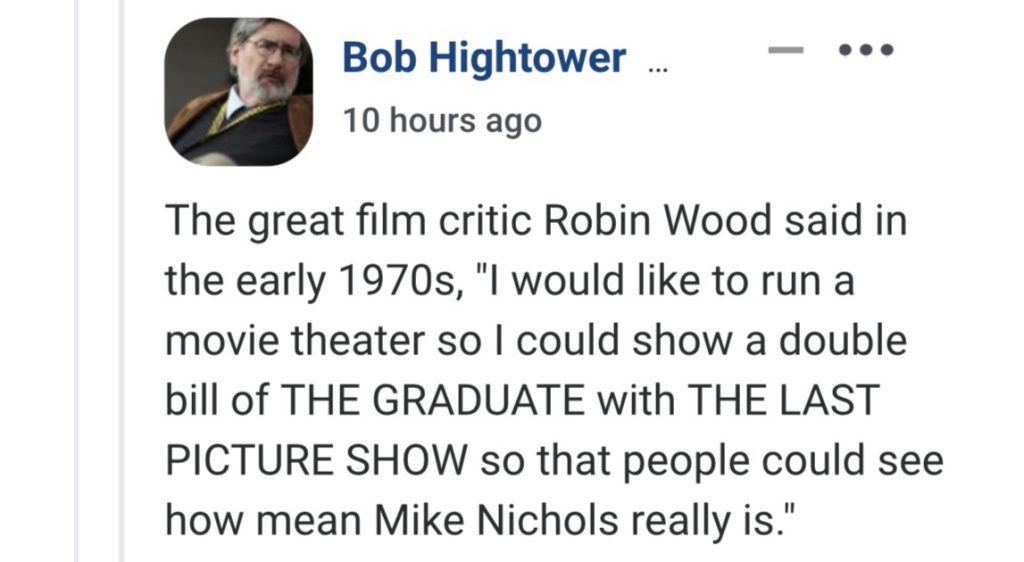
HE to Hightower: Mike Nichols was a sharp, witty, obviously gifted director. A bit of a snob, perhaps, but the man who helped create that brief Santa Barbara gas station scene was obviously not driven by a “mean” mindset or social callousness.
That guy who played the gas-station attendant was directed in just the right way. A genius-level cameo if I ever saw one. “Do ya need any gas, father?”
Mr. Hightower knows full well that most upper middle class teens and twentysomethings lived in their own membranes in the ‘60s and ‘70s. Kids who hail from relative comfort and affluence have always thought and lived this way. Benjamin Braddock and Tom Cruise’s Joel Goodson are two peas in a pod.
Mr. Hightower also knows that if The Graduate had focused more on caring and social activism or if Ben had mentioned an interest in civil rights or a Bob Dylan song or getting stoned or the Vietnam War the film would have been saddled with dated views and attitudes, and would mean a lot less to 21st Century viewers.
I obviously don’t mean Anne Bancroft Jr. but, you know, present-tense film buffs with at least a faint awareness of what happened in movies starting in the mid to late ‘60s until the early ‘80s tits-and-zits genre. Cinema fans who might have at least glanced at a review of Mark Harris’s “Pictures at a Revolution.”
The Graduate wasn’t just a smart, popular social satire that popped in late ‘67. It tapped into a tsunami of generation–gap feelings (plastics vs. rebellion, rebirth vs. tired cynicism) and constituted as much of a social earthquake flick as Easy Rider or Jaws or Star Wars or any other landmark social zeitgeist film from the last half-century or so.
It’s one thing for yesterday’s Zoomer girl (aka “Anne Bancroft, Jr.”) to have never sat down and watched The Graduate but to have never even fecking heard of it? C’mon, man. We’re all obliged to have at least a passing acquaintance with how things were in our grandparents’ heyday. When I was 15 I had at least heard of D.W. Griffith and Buster Keaton and The Shiek and Theda Bara and the 1926 death of Rudolph Valentino and King Vidor’s The Big Parade, etc.
There is no wokeness in The Graduate, granted. It’s basically about a young guy coming to find his own path and values instead of performing for his parents and satisfying their expectations.
Every generation goes through this.
If there’s a perception problem among Zoomer and Millennial women it’s that Katharine Ross’s Elaine seems, by today’s standards, to be a little bit of a hip kewpie doll or even a college-educated airhead. A daughter of wealth and privilege, she doesn’t seem to examine things all that deeply. She seems way too casual-minded about getting married to this or that guy.
But before feminism came along in the late ‘60s and ‘70s Elaine represented a fairly common mindset among younger, middle-class women.
